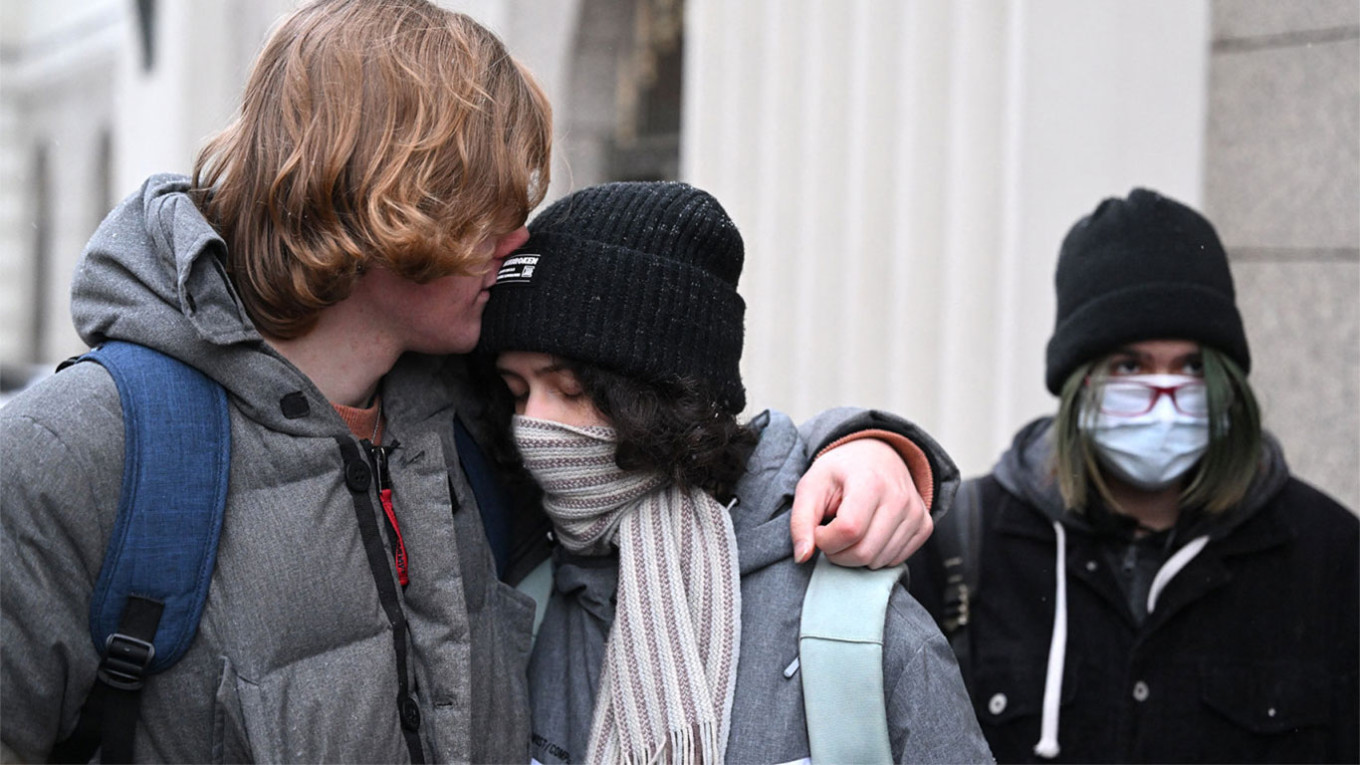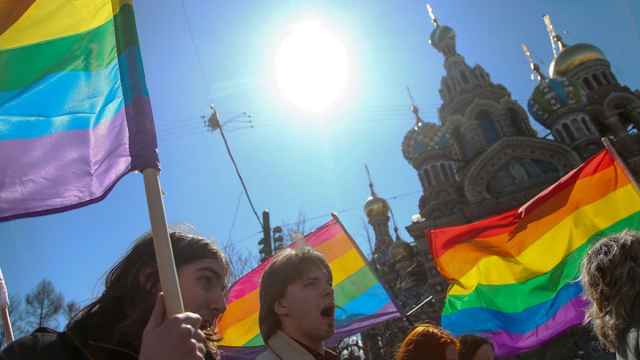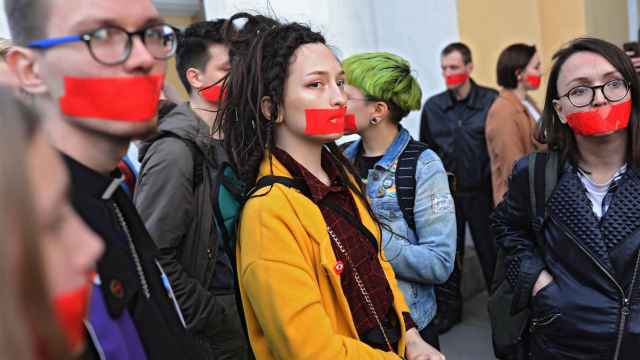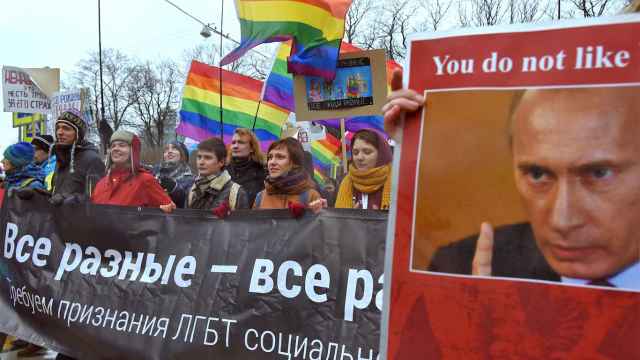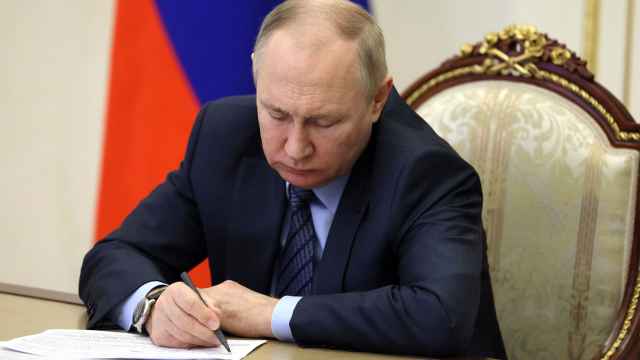ST. PETERSBURG — The ban on the “international LGBT movement” by Russia’s top court has thrown the queer community of St. Petersburg, historically one of the country’s most LGBT-tolerant cities, into unprecedented uncertainty and fear.
“People are scared,” said Maria, 43, an openly lesbian feminist and LGBT activist who asked for anonymity out of concerns of persecution.
“They were already not so sure about their safety, and now it will be even worse.”
Like many Russian LGBT people, Maria is now assessing the risks to her safety posed by the latest ban, which activists believe could spark a fresh wave of arrests and prosecution of Russia’s already pressured queer community.
“No one knows anything,” she said. “I am waiting for advice from legal experts and then I’ll decide what to do.”
Last week, Russia’s Supreme Court designated what it called “the international LGBT movement” as a banned “extremist” organization, cementing a years-long clampdown on the LGBT community.
In a closed hearing, the court ruled in favor of a motion filed by the Justice Ministry, which claimed the movement — which does not formally exist — is responsible for “inciting social and religious discord.”
The vague nature of Russia’s extremism laws, coupled with the lack of clarity around the definition of the “international LGBT public movement,” has left many wondering whether simply openly identifying as gay or lesbian could now be grounds for prosecution.
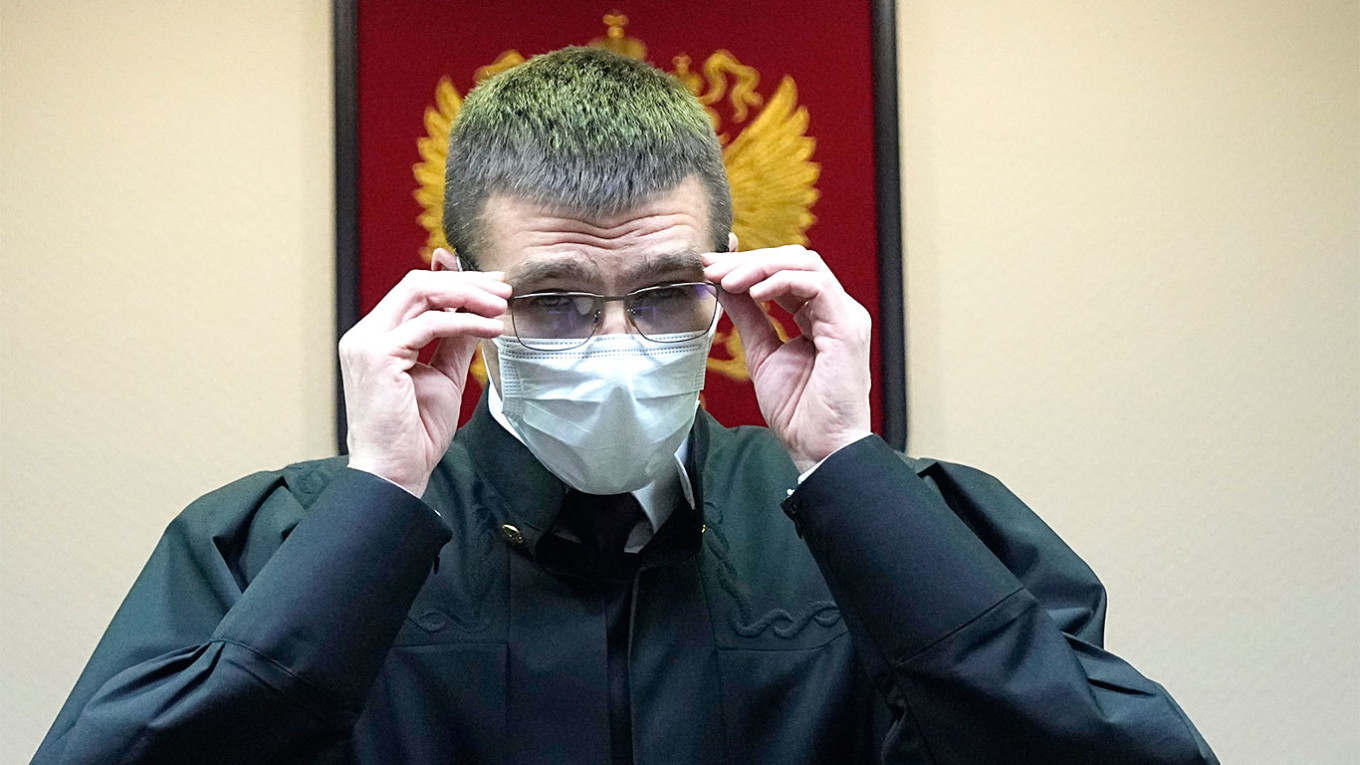
“If it was about an existing organization, it would be clear what to do: cut all the ties, stop communications [with the organization],” said Alexei, 44, a bisexual LGBT and human rights activist who wished to stay anonymous.
He said he fears that any public display of support for the LGBT community could be now labeled as “extremism.”
Under Russian law, individual participation in an extremist organization is punishable with up to six years in prison. The maximum sentence increases to 10 years for organizers of an extremist group.
“A person goes out with a rainbow flag: that’s it, he participated in the activities of the LGBT movement, up to six years in prison,” Alexei said.
“It's clear that you shouldn't wear an LGBT flag,” said Elena, a lesbian in her 30s who also asked for anonymity. “But is it safe to go to an LGBT-related event, party, or a drag show? Is it safe to use online dating apps to meet an LGBT person now?”
Russian human rights groups believe online activity carries the highest risk for average LGBT people and recommended deleting all social media posts that could be interpreted as a sign of support for the community. Even years-old posts could be considered violations of the ban and lead to prosecution, according to legal experts.
“That’s impossible to do,” said Alexander, 33, an event organizer who moved to St. Petersburg from the Siberian city of Tyumen and identifies as gay. “I have been writing so many posts and comments for so many years, I can’t remember where I left all that.”
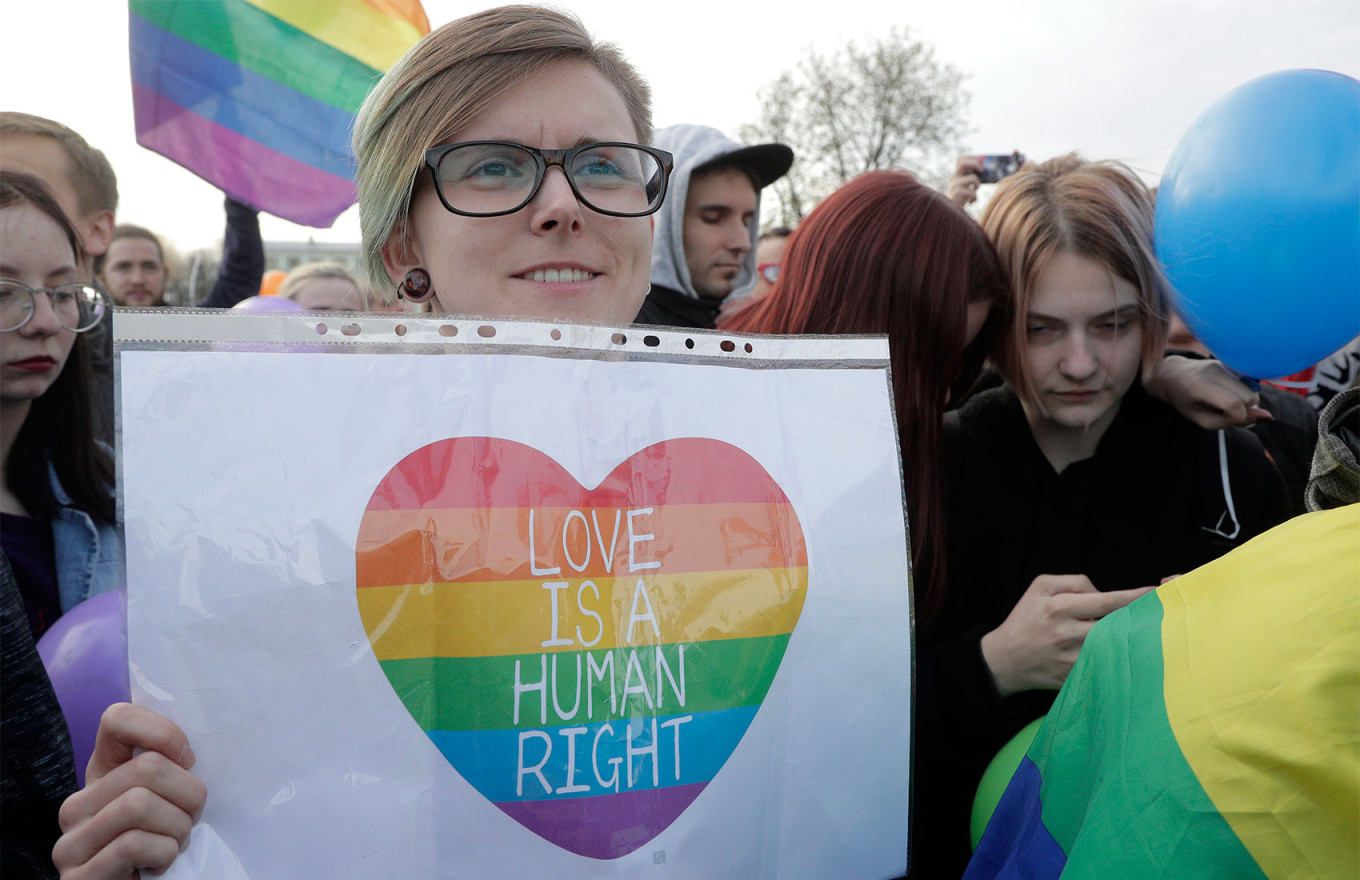
Others, like Maria, said they are more optimistic and think the law is unlikely to target people for simply identifying as LGBT.
“There will be still LGBT life no matter what,” she says. “People will continue getting into relationships although, of course, the law is making us more vulnerable.”
Since the invasion of Ukraine, the Russian government has intensified its pressure on the LGBT community amid a broader crackdown on all forms of internal dissent and nonconformism, casting it as part of its ideological confrontation with the liberal West.
In December 2022, Russia expanded its law banning “gay propaganda” toward minors to ban content aimed at any age group. In July, President Vladimir Putin signed a law banning gender-affirming surgeries and medical care as well as changing one’s gender markers on their documents.
“I am not panicking nor am I shocked because I am used to these things happening here,” said Maria.
To many, the timing of the ban does not come as a coincidence. They see it as part of a government effort to consolidate Russian society under the banner of “traditional values” ahead of next year’s presidential election, in which Putin is widely expected to extend his rule until at least 2030.
“There will be some [criminal] cases before the elections to show that the state is fighting against this ‘harmful movement,’ that ‘we are for traditional values’,” Alexei predicted.
Although the Supreme Court’s ban comes into force on Jan. 10 next year, its effects are already noticeable and wide-reaching.
Just a day after the court’s ruling, Moscow police reportedly carried out raids on the capital’s gay nightlife. In St. Petersburg, one of the city’s oldest gay clubs, Central Station, announced it would shut down after the venue’s owners refused to extend its lease because of the law. The dating app Pure removed the ability to indicate one’s sexual orientation for Russia-based users.
Human rights group Delo LGBT+, which provided legal aid to Russia’s LGBT community, announced its closure on the day of the court’s decision. Many have voiced concerns that the shutdown of such groups could leave LGBT people even more vulnerable to abuse and harassment, which are likely to increase as a result of the ban.
“Many LGBT people thought that this decision wouldn’t affect them, that it would affect only activists,” Alexei said. “But we see it is also hitting that part of the community that is far from activism.”
The new law is likely to intensify the exodus of LGBT people and activists from Russia that has gathered momentum since start of the war in Ukraine.
Equal PostOst, a Berlin-based LGBT rights group working in former Soviet countries, said Tuesday it has seen a sixfold increase in requests for help from LGBT people trying to evacuate Russia since the Supreme Court’s ban.
Alexei, who coordinated several LGBT rallies in St. Petersburg in recent years, said he will likely be among those most at risk of prosecution and is considering leaving the country, at least for some time.
“I think the upcoming months will be a red zone,” he said.
Alexander, who had already been considering emigration for years, said he is now working on gathering the documents he needs to move to Europe.
“It is a forced action now,” he explains.
Despite the potential risks to their safety, many LGBT Russians choose to stay in the country for a variety of reasons, including the high cost of emigration, concerns of anti-Russian sentiment in the West or simply an attachment to their home country and their loved ones.
“This is my country, and not just our government’s,” said Maria, who doesn’t intend to leave her native St. Petersburg. “I want to be happy here, I want to love here, and I want to be myself here.”
She said she believes that the Kremlin’s anti-LGBT policies do not necessarily reflect what ordinary Russians actually think — and that she still hopes to support members of her community in her private life despite the new restrictions.
“I hope that despite all these government's decisions our society is far healthier than our government,” Maria said.
Elena echoed this sentiment.
“I want to believe that Russian LGBT people will find their way to live peacefully in Russia,” said Elena. “That's one of the reasons I stay.”
A Message from The Moscow Times:
Dear readers,
We are facing unprecedented challenges. Russia's Prosecutor General's Office has designated The Moscow Times as an "undesirable" organization, criminalizing our work and putting our staff at risk of prosecution. This follows our earlier unjust labeling as a "foreign agent."
These actions are direct attempts to silence independent journalism in Russia. The authorities claim our work "discredits the decisions of the Russian leadership." We see things differently: we strive to provide accurate, unbiased reporting on Russia.
We, the journalists of The Moscow Times, refuse to be silenced. But to continue our work, we need your help.
Your support, no matter how small, makes a world of difference. If you can, please support us monthly starting from just $2. It's quick to set up, and every contribution makes a significant impact.
By supporting The Moscow Times, you're defending open, independent journalism in the face of repression. Thank you for standing with us.
Remind me later.



